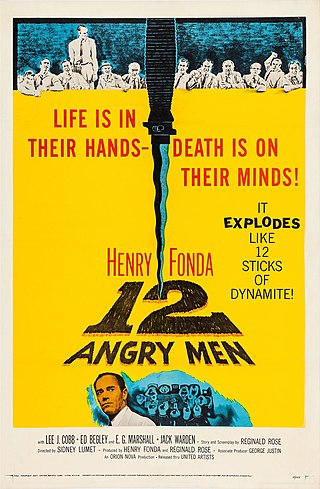
12 Angry Men is a 1957 American independent legal drama film directed by Sidney Lumet, adapted from a 1954 teleplay of the same name by Reginald Rose. The film tells the story of a jury of 12 men as they deliberate the conviction or acquittal of a teenager charged with murder on the basis of reasonable doubt; disagreement and conflict among them force the jurors to question their morals and values. It stars Henry Fonda, Lee J. Cobb, Ed Begley, E. G. Marshall, and Jack Warden.
Julius Jennings Hoffman was an American attorney and jurist who served as a United States district judge of the United States District Court for the Northern District of Illinois. He presided over the Chicago Seven trial.

The Scottsboro Boys were nine African-American male teenagers accused of raping two white women in 1931. The landmark set of legal cases from this incident dealt with racism and the right to a fair trial. The cases included a lynch mob before the suspects had been indicted, all-white juries, rushed trials, and disruptive mobs. It is commonly cited as an example of a legal injustice in the United States legal system.
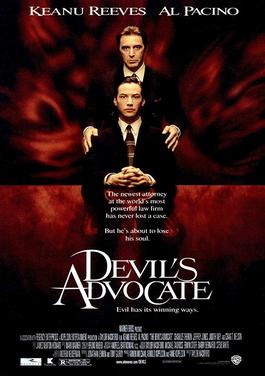
The Devil's Advocate is a 1997 American supernatural horror film directed by Taylor Hackford, written by Jonathan Lemkin and Tony Gilroy, and starring Keanu Reeves, Al Pacino, and Charlize Theron. Based on Andrew Neiderman's 1990 novel of the same name, it is about a gifted young Florida lawyer invited to work for a major New York City law firm. As his wife becomes haunted by frightening visions, the lawyer slowly realizes the firm's owner, John Milton, is in fact the Devil.

Carlito's Way is a 1993 American crime drama film directed by Brian De Palma and written by David Koepp, based on the novels Carlito's Way (1975) and After Hours (1979) by Judge Edwin Torres. It stars Al Pacino, Sean Penn, Penelope Ann Miller, Luis Guzman, John Leguizamo, Jorge Porcel, Joseph Siravo, and Viggo Mortensen.

Brian Gene Nichols is a convicted murderer known for his escape and killing spree in the Fulton County Courthouse in Atlanta, Georgia, on March 11, 2005. Nichols was on trial for rape when he escaped custody and murdered the judge presiding over his trial, a court reporter, a Fulton County Sheriff's deputy, and later an ICE special agent. Twenty-six hours after a large-scale manhunt was launched in the metropolitan Atlanta area, Nichols was taken into custody. The prosecution charged him with committing 54 crimes during the escape; he was found guilty on all counts on November 7, 2008 and was subsequently sentenced to life in prison.

Find Me Guilty is a 2006 American courtroom comedy-drama film co-written and directed by Sidney Lumet. The film is based on the true story of the longest Mafia trial in American history. Much of the courtroom testimony was taken from the original court transcripts. Vin Diesel stars as Jackie DiNorscio, a New Jersey mobster who is on trial with 19 of his colleagues for racketeering. A wrench is thrown into the system when DiNorscio fires his lawyer and decides to represent himself. The film also stars Peter Dinklage, Linus Roache, Alex Rocco, and Ron Silver.

A courtroom is the enclosed space in which courts of law are held in front of a judge. A number of courtrooms, which may also be known as "courts", may be housed in a courthouse. In recent years, courtrooms have been equipped with audiovisual technology to permit everyone present to clearly hear testimony and see exhibits.
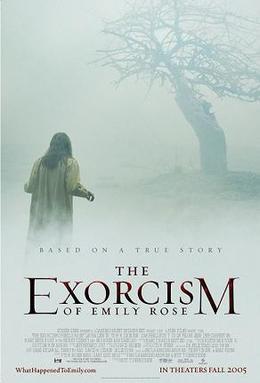
The Exorcism of Emily Rose is a 2005 American supernatural horror legal drama film directed by Scott Derrickson and starring Laura Linney and Tom Wilkinson. The film is loosely based on the book The Exorcism of Anneliese Michel by Felicitas D. Goodman, which tells the story of Anneliese Michel and follows a self-proclaimed agnostic (Linney) who acts as defense counsel representing a parish priest (Wilkinson), accused by the state of negligent homicide after he performed an exorcism.

A Time to Kill is a 1996 American legal drama film based on John Grisham's 1989 novel of the same name. Sandra Bullock, Samuel L. Jackson, Matthew McConaughey, and Kevin Spacey star with Donald and Kiefer Sutherland appearing in supporting roles and Octavia Spencer in her film debut. The film received mixed reviews but was a commercial success, making $152 million worldwide. It is the second of two films based on Grisham's novels directed by Joel Schumacher, with the other being The Client released two years prior.

Floyd Allen was an American landowner and patriarch of the Allen clan of Carroll County, Virginia. He was convicted and executed for murder in 1913 after a sensational courthouse shootout the previous year that left a judge, prosecutor, sheriff, and two others dead, although the validity of the conviction has been a source of debate within Carroll County for decades. Allen, who was before the bar for sentencing after being convicted of taking a prisoner from a deputy sheriff, allegedly triggered the shooting at the Carroll County Courthouse in Hillsville on March 14, 1912.

The Washington County Courthouse in Hillsboro, Oregon is the courthouse for Washington County, Oregon, in the United States. Washington County was established in 1843 and the first government building was finished in 1852. The current courthouse was built in 1928 with an addition and renovations to the structure in 1972. Currently the building houses courtrooms, the county sheriff's dispatch, staff offices, and the office of the district attorney. The county jail was previously attached to the courthouse.

The State Courts of Singapore is one of the three categories of courts in Singapore, the other categories being the Supreme Court and Family Justice Courts. The State Courts comprise the District and Magistrate Courts—both of which oversee civil and criminal matters—as well as specialised courts such as the coroner's courts and the Small Claims Tribunals.
Trial films is a subgenre of the legal/courtroom drama that encompasses films that are centered on a civil or criminal trial, typically a trial by jury.
Inherit the Wind is an American play by Jerome Lawrence and Robert Edwin Lee, which debuted in 1955. The story fictionalizes the 1925 Scopes "Monkey" Trial as a means to discuss the then-contemporary McCarthy trials.
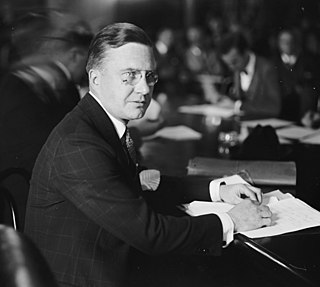
Weymouth Kirkland was a Chicago lawyer and one of the name partners of the Chicago law firm of Kirkland & Ellis.
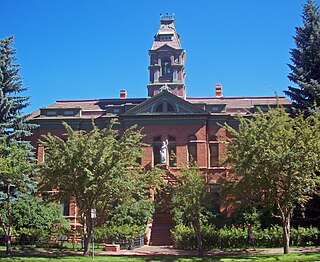
The Pitkin County Courthouse is located on East Main Street in Aspen, Colorado, United States. It is a large brick building erected in the late 19th century that serves as offices of Pitkin County's courts. A landmark of the city, it was listed on the National Register of Historic Places in 1975.

Tom Sawyer, Detective is a 1938 American mystery comedy film directed by Louis King, written by Robert Yost, Lewis R. Foster and Stuart Anthony, and starring Billy Cook, Donald O'Connor, Porter Hall, Phil Warren, Janet Waldo, Elisabeth Risdon and William Haade. It was released on December 23, 1938, by Paramount Pictures.
The lynching of Willie Earle took place in Greenville, South Carolina on February 16, 1947, when Willie Earle, a 24-year-old black man, was arrested, taken from his jail cell and murdered. It is considered the last racially motivated lynching to occur in South Carolina. The subsequent trial gained much media attention, and was covered by Rebecca West for The New Yorker. The trial resulted in the acquittal of 31 white men who had been charged with Earle's murder.
The sentencing of Ben Oliver, a 25-year-old man convicted of the manslaughter of his grandfather, was the culmination of a Crown Court case in England and Wales, and the sentencing was the first criminal court proceeding in England and Wales to be televised. Oliver was convicted of killing his 74-year-old bedbound grandfather, David Oliver, of Mottingham, South East London, following a trial at the Old Bailey, where he had pleaded not guilty to murder. At the televised hearing, which took place in Court Two of the Old Bailey at 10 am on 28 July 2022, he was sentenced to life imprisonment with a minimum of ten years by Her Honour Judge Sarah Munro.















